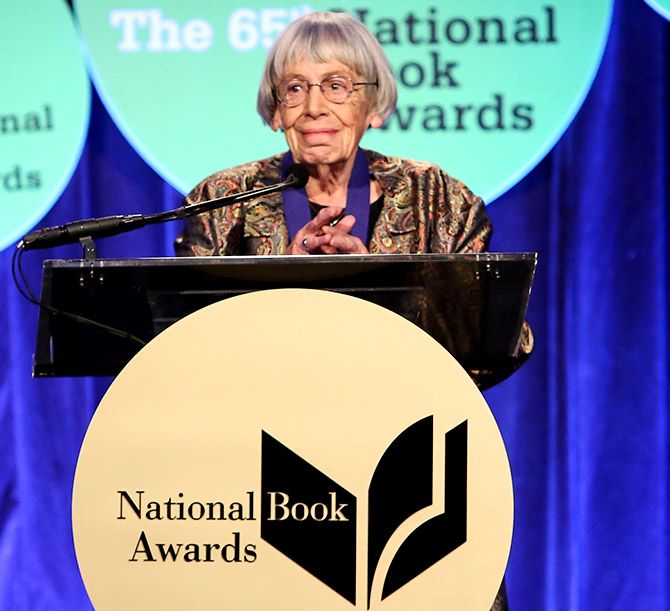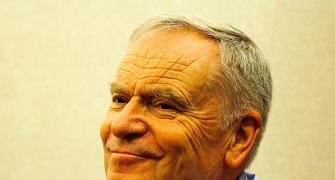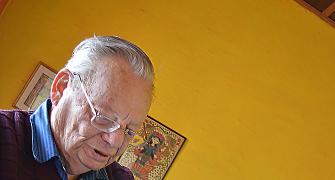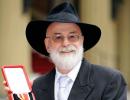1929-2018: The life and legacy of Ursula K Le Guin in her own words.

She has inspired authors like Salman Rushdie and Neil Gaiman.
Photograph: Robin Marchant/Getty Images.
Ursula K Le Guin, the award-winning science fiction and fantasy author who has inspired authors like Salman Rushdie and Neil Gamon, passed into the ages on January 22. She was 88.
In a career that began in the 1960s and spanned decades, Le Guin published over 20 novels, children's books, short stories, poetry and essay collections.
Le Guin's breakthrough success came with the publication of The Left Hand of Darkness in 1969; the novel became a science fiction classic. But she is best remembered for her bestselling Earthsea series, which has not only been translated into several languages, but also been and adapted for the screen.
In 2003, Le Guin was honored with the 'Grandmaster of science fiction' award by the Science Fiction and Fantasy Writers of America; she is still one of very few women who have earned the genre's top honour.
However, Le Guin disliked being fenced in as a 'science fiction writer'.
In an interview to Jonathan White in 1994 (from Talking on the Water: Conversations about Nature and Creativity) she said, 'I didn't exactly choose science fiction. I went where I got published, which took a long time because my work is so odd.
'For the last 50 or 60 years, literature has been categorised as "realism," and if you weren't writing realism, you weren't respectable. I had to ignore that and say to myself that I could do things in science fiction that I could never do in realism.
'I tend to be prickly about this subject because I get tired of being put down as a science fiction writer.
'The fact is, in the post-modern era, all the barriers are breaking down pretty fast.
'I've been editing The Norton Book of Science Fiction, which has inspired some new thoughts on this matter. For instance, I've learned that science fiction is a child of realism, not of fantasy. A realistic story deals with something that might have happened but didn't, right? Many science fiction stories are about worlds that don't exist, but could exist in the future. Both realism and science fiction deal with stories that might be true.
'Fantasy, on the other hand, tells a story that couldn't possibly be true. With fantasy, we simply agree to lift the ban on the imagination and follow the story, no matter how implausible it may be.'
While tributes pour in -- horror writer Stephen King mourned her as 'one of the greats' and tweeted, 'Not just a science fiction writer; a literary icon. Godspeed into the galaxy' -- we look back at her legacy through her quotes.
On being a writer
We who live by writing and publishing want and should demand our fair share of the proceeds; but the name of our beautiful reward isn't profit. Its name is freedom.
-- National Book Awards acceptance speech, 2014
A writer is a person who cares what words mean, what they say, how they say it. Writers know words are their way towards truth and freedom, and so they use them with care, with thought, with fear, with delight. By using words well they strengthen their souls. Story-tellers and poets spend their lives learning that skill and art of using words well. And their words make the souls of their readers stronger, brighter, deeper.
-- From A Few Words to a Young Writer
On books
Books aren't just commodities; the profit motive is often in conflict with the aims of art. We live in capitalism, its power seems inescapable – but then, so did the divine right of kings. Any human power can be resisted and changed by human beings. Resistance and change often begin in art. Very often in our art, the art of words.
-- National Book Awards acceptance speech in 2014
We read books to find out who we are. What other people, real or imaginary, do and think and feel... is an essential guide to our understanding of what we ourselves are and may become.
-- From The Language of the Night, 1979
On breaking barriers in science fiction
I'd like to ask the men here to consider idly, in some spare moment, whether by any chance they've been building any walls to keep the women out, or to keep them in their place, and what they may have lost by doing so.
-- At AussieCon, the 33rd Worldcon science fiction convention, 1975
I can imagine myself blurbing a book in which Brian Aldis, predictably, sneers at my work, because then I could preen myself on my magnanimity. But I cannot imagine myself blurbing a book, the first of a new series and hence presumably exemplary of the series, which not only contains no writing by women, but the tone of which is so self-contentedly, exclusively male, like a club, or a locker room. That would not be magnanimity, but foolishness. Gentlemen, I just don't belong here.
— A letter to publisher John Radziewicz, turning down a request to blurb New Science Fiction, Volume 1, 1987
On gender
We are volcanoes. When we women offer our experience as our truth, as human truth, all the maps change. There are new mountains.
-- Bryn Mawr Commencement Address, 1986
I have frequently described myself as a feminist, because feminist thinking and writing of the '60s and '70s had a huge liberating influence on me, setting my mind free from a whole lot of masculist bigotries and superstitions; and so it would be untruthful and ungrateful not to call myself a feminist… Besides, when you say you're a feminist it annoys the bigots and the old farts and the prissy ladies so much, it's kind of irresistible.
-- From an interview to Deathray, 2007
On politics
He had grown up in a country run by politicians who sent the pilots to man the bombers to kill the babies to make the world safe for children to grow up in.
-- From The Lathe of Heaven, 1971
If civilization has an opposite, it is war. Of these two things, you have either one, or the other. Not both.
-- From The Left Hand of Darkness, 1969
On science
It is only when science asks why, instead of simply describing how, that it becomes more than technology. When it asks why, it discovers Relativity. When it only shows how, it invents the atom bomb, and then puts its hands over its eye and says, 'My God what have I done?'
-- From The Language of the Night, 1979
Scientific truth will out, you can't hide the sun under a stone.
-- From The Dispossessed, 1974
On living
The only thing that makes life possible is permanent, intolerable uncertainty; not knowing what comes next.
-- From The Left Hand of Darkness, 1969
Death and life are the same thing -- like the two sides of my hand, the palm and the back. And still the palm and the back are not the same...They can be neither separated, nor mixed.
-- From The Farthest Shore, 1972
Recommended for you: The Margaret Atwood touch at the Golden Globes









